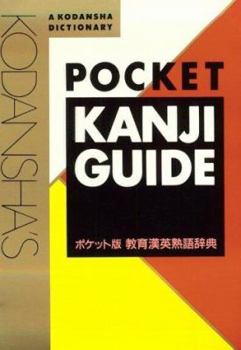Kodansha's Pocket Kanji Guide
Select Format
Select Condition 
Book Overview
This pocket-size character dictionary includes 1006 "shin-kyoiki" kanji plus over 10,000 kanji compounds in an easy-to-use format. This description may be from another edition of this product.
Format:Paperback
Language:English
ISBN:4770018010
ISBN13:9784770018014
Release Date:July 1994
Publisher:Kodansha
Length:576 Pages
Weight:0.05 lbs.
Dimensions:1.2" x 4.2" x 5.8"
Customer Reviews
5 ratings
This book is for LEARNING Kanji, not for reading Japanese
Published by Thriftbooks.com User , 20 years ago
I have noticed that a number of the purchasers of this book made the same mistake I did when I purchased it. This pocket guide covers the shinkyouiku kanji only. That is, the 1006 kanji that all Japanese are expected to be able to read and write. For students of Japanese then, this is a very handy reference during the learning process. It is NOT a sufficient reference for general use when reading written material - Kodansha's Compact Guide, which covers the 1945 jouyou kanji all Japanese are expected to be able to read and that make up the majority of written Japanese, would be a better reference.
This has been reprinted!
Published by Thriftbooks.com User , 21 years ago
Apparently this is reprinted as the (larger) . I prefer this version, as it's smaller. I agree it could use more entries, but hey, it's a pocket guide, ya know? I like it a lot.
Nice for use around town.
Published by Thriftbooks.com User , 24 years ago
For a pocket dictionary it is a very nice compromise between size and content. It is small (31.6 cubic inches vs 59.7 cubic inches for the larger Kodansha's Compact Kanji Guide), yet it contains almost all the kanji and a great number of the compounds I run into while getting around Japan. It contains only the 1006 Shinkyoiku Kanji, which it claims covers 90% of the Kanji in the daily newspaper, and I've had a MUCH higher success rate than that reading signs around Tokyo - which is where I primarily use this dictionary. I've looked at a fair number of "pocket" kanji dictionaries at bookstores here in Japan and choose this one. Pro's:1) Good number of nice practical compounds, esp. considering size. 2) VERY Nice radical index at end for scanning kanji which contain a given radical - including kanji where radical is not the primary radical. 3) ON/KUN reading index 4) Complete Stroke Count index --VERY NICE for those kanji with hard-to-find radicals.Con's: 1) Uses the historical radicals (like Nelson's dictionary) - some people might find this a pro, but my personal preference is for Spahn's radicals. 2) The readings are not in romanji - I overcame this by sticking a Hiragana/Katakana chart in as a bookmark. -- Once again you might consider this a pro - in that it is forcing me to practice Hiragana & Katakana. In summary...to carry with you as you travel, this is the one I recommend. If you want a complete Kanji dictionary, I recommend Mark Spahn's Kanji Dictionary.
Excellent for what it is
Published by Thriftbooks.com User , 24 years ago
An excellent little dictionary. First a warning: this is a *pocket* dictionary. It only has 1006 kanji, so you aren't going to be able to find a lot of the less common kanji. So why did I give it 5 stars? It isn't meant to be a comprehensive dictionary. The small size enforces limits. What it does do is provide very clear readings and meanings for the kanji it contains, and numerous compounds. The readings are all in kana, which I like (if you don't know kana, you will obviously find it difficult to use). Finally, it is small enough to conveniently carry around. I keep mine in my backpack and take it to work with me every day. I can use it to translate most of the memos that show up on my desk! I find this little book extremely useful living in Japan.
I love my little dictionary...indispensable.
Published by Thriftbooks.com User , 26 years ago
When I started studying Japanese I was really confused and unsure how I would ever be able to look up kanji characters and make sense of them. This book, which I bought without knowing how I would conquer it, has proved to be the answer. Looking back it now seems simple, but I learnt it all from reading the introduction to this dictionary, many times, and then lots of trying to find kanji characters. And you know, it feels really great when you can master the technique of rapidly and almost automatically looking up kanji characters. I love my little dictionary and use it often. OK why? - well the Introduction and "Users Manual" are well written, and explain things like on-reading, kun-reading, and compound combinations. The kanji entries show the stroke order, which is essential learning. The indices are the key to rapid usage and are easy to follow. It is small enough to carry when you travel and to study on the plane. By the way you have to know the Japanese writing system and the hiragana and katagana tables are provided in the Users Manual. In fact it is a very practical way to reinforce your knowledge of hiragana and katakana. Indispensable.





